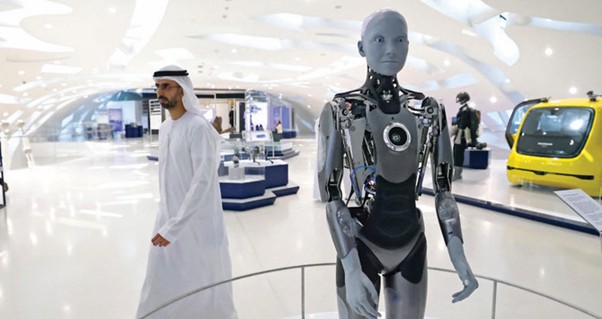Date: December 5, 2018
Legislation and a well-thought-out investment climate for digital knowledge-based infrastructure for non-competitive Arab integration to ensure everyone benefits –
Under the patronage of His Highness Sheikh Mohammed bin Zayed Al Nahyan, Crown Prince of Abu Dhabi and Deputy Supreme Commander of the UAE Armed Forces, the capital, Abu Dhabi, will host the first conference on developing the joint Arab vision for the digital economy from December 16-17.
This conference, announced today, Wednesday, in Cairo at the General Secretariat of the Council of Arab Economic Unity at the League of Arab States, is part of the Council’s efforts to keep pace with major global transformations in the digital economy by mobilizing Arab capabilities and international expertise, and activating joint Arab cooperation to achieve a set of positive goals that will advance Arab societies.
The conference aims to present the themes of the joint Arab strategy for the digital economy to representatives of Arab countries, experts, thinkers, academics, and Arab and international practitioners. The strategy will result in development initiatives and projects that will highlight the economic opportunities available to Arab League member states in the areas of digital transformation, under a framework of non-competitive Arab integration to ensure that all Arab countries benefit from these opportunities.
The conference was announced at the headquarters of the General Secretariat of the Council of Arab Economic Unity, in the presence of Ambassador Mohamed Mohamed Al-Rabie, Secretary-General of the Council of Arab Economic Unity; Engineer Atef Helmy, former Egyptian Minister of Communications and Information Technology; Dr. Ali Al-Khouri, Advisor to the Council of Arab Economic Unity; and a number of experts in the field of digital economy.
His Excellency Ambassador Mohamed Mohamed Al-Rabie, Secretary-General of the Council of Arab Economic Unity, emphasized the importance of the conference, saying: “We had hope and ambition when we launched the Arab Common Market in 1964. Today, the European Union has achieved what we aspired to, the African Union is racing against time to achieve a common African market, and the Association of Southeast Asian Nations has reached advanced levels in this field. We in the Arab world continue to face internal and external challenges one after another. Despite this, we are hopeful that there is a golden opportunity today to advance our Arab world through the digital economy.”
He added, “We have tremendous potential, resources, and a geographical location, and most importantly, a generation that aspires to the best, is passionate about technology, and possesses the potential to succeed in software, electronics, and modern technologies. The Arab millennial generation has an instinct for technological knowledge, and will, along with their global peers, represent nearly 75% of the workforce by 2025. We do not want this generation to be mere consumers, but rather producers, innovators, innovators, and pioneers in the digital economy, taking their natural place in the advancement of their societies and the Arab nation.”
The Secretary-General praised the role of the UAE and its leaders, saying, “We have the UAE, whose leaders are today offering their expertise and achievements to support a shared Arab vision for the digital economy, sharing their organizational and technological progress and successful experiences in the fields of economics and digital transformation with the Arab nation. The UAE’s leaders are doing everything in their power to advance Arab societies and economies with unprecedented support, attention to detail, and care.”
He concluded by saying, “We will manage a set of axes to support Arab governments’ digital transformation plans, enhance financial inclusion plans, and support the development of knowledge, legislative, and technological infrastructure to enable the young Arab generation to achieve their hopes and aspirations in the field of modern technologies.” He expressed his deep gratitude to the UAE and its leaders for their insightful strategic vision to support joint Arab cooperation in light of global transformations.
Dr. Ali Mohammed Al Khouri, Advisor to the Council of Arab Economic Unity, presented the most important desired outcomes of the conference: “The conference aims to present the axes of the joint Arab strategy for the digital economy that support sustainable development and investment in technology projects and infrastructure in the Arab world.”
Al Khouri continued by saying, “A number of international and Arab institutions and organizations, as well as more than 70 leading international experts and specialists in the field of the digital economy, are participating in drafting the strategy. We have also established subcommittees with the participation of numerous international and Arab entities to review the strategy before launching it at the conference, including the United Nations, the World Bank, the European Commission, the Organization for Economic Co-operation and Development, the Office for Digital Government Services of the UK Cabinet Office, and other institutions working in the field of the digital economy.”
Al-Khouri revealed that the conference will address the economic opportunities available to Arab countries as a result of digital transformation, emphasizing the presence of investments from global investment funds in technology sectors that are flowing into the Arab world, in addition to the huge opportunities for inter-Arab investments in digital economy infrastructure.
Dr. Al-Khouri emphasized that “our youth in the Arab region are more connected, more optimistic, and more hopeful than ever before. Our region boasts a large youth population, approximately 60% of whom are under the age of thirty. We have a huge demographic dividend that requires us to invest in digital economy infrastructure to advance their roles and creativity. Legislation and a well-thought-out investment climate for knowledge and technology infrastructure will attract capital in ways that meet the positive goals sought for the Arab people.”











